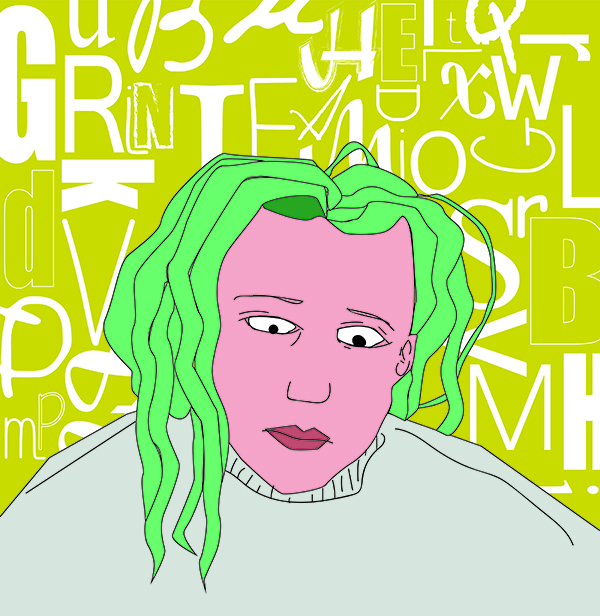The Queer Poet Society :: Vol. 1

As a queer person and literature student, poetry is sympathetic to my experience. I have decided to share with you some queer literature that is beautiful, easy to empathize with, and influential to the world of writing.
I chose to start with a very well known set of poems by openly gay Beat poet Allen Ginsberg, Howl. This work is split into three parts, all of them dedicated to his then lover, Carl Solomon. The three poems discuss intensely real themes about life including sex, mental illness, abuse of drugs and alcohol, and religion. You can read the poem, Howl here, and I strongly recommend you do so before continuing.
Interpretation
The first piece, which is also the longest, seems to be a long discussion about how Ginsberg sees “the best minds of my generation destroyed by madness…” The poem could be interpreted as an elaborate, detailed, and in-depth exploration of how he has observed these men go down a path of turmoil and madness. It also comes across as being a critique on the violent nature of our capitalistic system and appearance-based society, when he says “…who were burned alive in their innocent flannel suits on Madison Avenue amid blasts of leaden verse & the tanked-up clatter of the iron regiments of fashion & the nitroglycerine shrieks of the fairies of advertising & the mustard gas of sinister intelligent editors, or were run down by the drunken taxicabs of Absolute Reality…”
The second poem begs a similar theme of critiquing society, where Ginsberg alludes to our culture as being analogous to Moloch, a god of child sacrifice referenced in biblical texts. This interpretation beckons us to question what we give to our society, and what it means to live in it.
“What sphinx of cement and aluminum bashed open their skulls and ate up their brains and imagination?…
Moloch in whom I sit lonely! Moloch in whom I dream Angels! Crazy in Moloch! Cocksucker in Moloch! Lacklove and manless in Moloch!
Moloch who entered my soul early! Moloch in whom I am a consciousness without a body! Moloch who frightened me out of my natural ecstasy!”
Ginsberg here seems to be stating that our culture takes away our imagination, and attempts to shape us into a mold of what we are “supposed to be.” This is apparent through his use of metaphor, where one is only a psyche in the body of Moloch.
Moloch is used in this poem as a good of power and greed, invoked by Ginsberg in order to attempt to portray the society we live in, and spark revolt in the hearts of the people who threaten to be consumed by Moloch. The souls already taken by Moloch are portrayed in the first part of the poem as rebels to society who fall to madness.
The last part of the poem is very intimate, and the connection Solomon, his lover is very apparent. Ginsberg states at the beginning of every line, “I’m with you in Rockland…” referring to the psychiatric hospital Solomon often occupied. What follows seems to almost be a description of Solomon slowly slipping into madness, where Ginsberg progresses from “you” to “we” and then “my,”and ends with a tearful reunion in the narrator’s dreams. Despite not ending up together, the intimate relationship they shared ended up shaping Ginsberg’s life and art.
“…in my dreams you walk dripping from a sea-journey on the highway across America in tears to the door of my cottage in the Western night.”
The sense of closeness to Solomon through the narrator is strong and constant throughout the piece, and this part of the poem is most certainly the most intimate concerning his relationship with him.
But my favorite part by far of the entire piece is the footnote, expressing his sacred view of his life, friends, and the universe, which contrasts to the more intense tone taken before “Holy time in eternity holy eternity in time holy the clocks in space holy the fourth dimension holy the fifth International holy the Angel in Moloch!
…Holy forgiveness! mercy! charity! faith! Holy! Ours! bodies! suffering! magnanimity!”
This poem is considered one of the most influential poems in queer American history, inviting people to question the life they live and challenge the norms of society. Through Ginsberg’s poetic story telling, he uses personal experience that is relatable to the reader, and intense imagery in order to create a dialogue about more than just homosexuality—society itself. Today his words keep the flame of life-changing art alive, and invite more people to create and consume art.
What's Your Reaction?
Sid Pasquino is an intern for the editorial team at OUT FRONT, as well as a local Coloradan. He studies liberal arts at St. Johns College in Santa Fe, New Mexico. He is an avid dog lover, and always excited to talk about classical literature.







